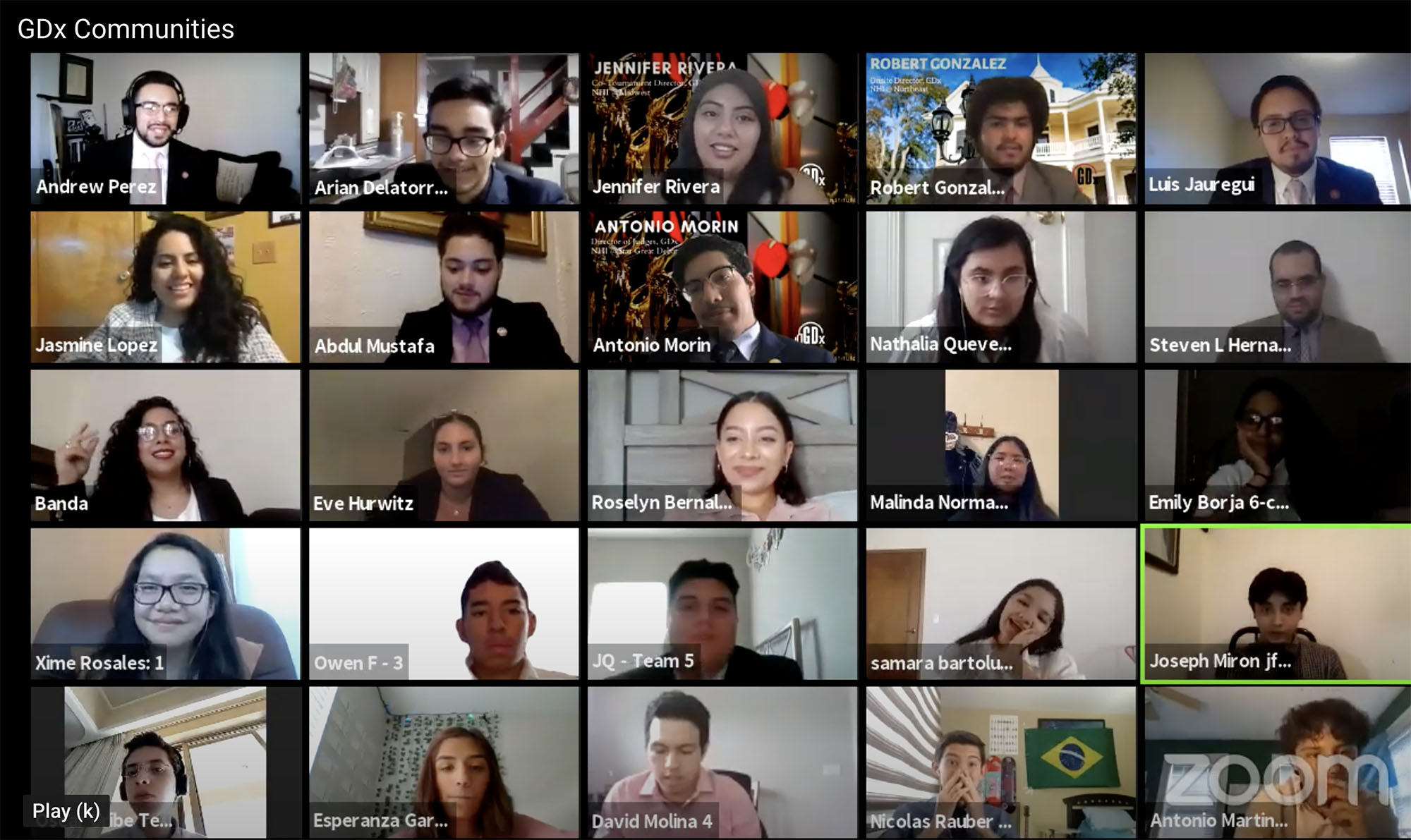GDx, NHI Programs
GDx Communities competition ends with spirited awards ceremony

Though events like the Midwest Great Debate, Northeast Great Debate, Mexico Great Debate, and Colorado Great Debate weren’t able to physically convene this year, a brand new National Hispanic Institute online event emerged in 2020. The first-ever GDx Communities program allowed students throughout the U.S. (including Puerto Rico) and Mexico. Nearly 70 students convened for the first-ever digital version of the six-day Great Debate, where students were able to develop their public speaking and communication skills. The event concluded Wednesday with a finals competition and an award ceremony in which a number of participants came away being honored for their hard work and spirit.
“This program was created upon the foundation of programs that came before it and it helped lay the foundation for those that will follow,” observed Andrew Perez, the program’s Co-Educational Director. “Each staff member was tasked with creating entire individual aspects of the program off of nothing other than their prior program experience and their staff training.”
“This program will help pave the way for future programs in terms of structure, communication, and building leaders,” he added, also noting that the program isn’t necessarily confined to the week the students met. “As we left the participants with a few final thoughts, such as ‘the program ends when you let it,'” he noted, “we were trying to embody the spirit of the Communities Great Debate as we asked the students: what is next in their NHI journey?”
Students were organized into teams before the program even started. There was a twist on the usual draft that starts a six-day Great Debate: Students submitted TikTok videos to showcase themselves, and coaches drafted them into teams in part based on those submissions.
The Hammys team, by virtue of getting a number of its participants into the finals, won the competition, but three other teams placed students on the individual event podiums.
“Transitioning to online programming was a shift for most of our staff,” Perez observed. “At the beginning of the program, a lot of people were unsure of the bonds that could be formed via a digital interface. After the first icebreakers and combine activities, all of the teams began to bond over their shared experience and a common desire to form a community.”
“Despite the issues that schools and educational institutions are facing around the country,” added co-Educational Director Steven Hernandez, “we were able to keep students engaged and keep the focus of the Great Debate where it is meant to be: Developing student’s communications skills and giving them the environment to build relationships and bonds with other members of the Latino community across the US and Latin America, most whom they would not have met otherwise. The tournament serves as a vehicle to get us to where young NHIers learn and thrive in an immersive disruptive state that develops their leadership and communication skills by fostering the environment for friendly competition and collaborative learning, and it is evident in the continued communications amongst students and their teams that while the logistics of the program have ended, the impact of the program carries on.”
Award winners included:
Oratory
- All-State: Janelly Vargas, Judson Early College Academy, Converse, Texas (Brain Dept.)
- 2nd Place: Guillermo Gomez Blanco, Instituto de Ciencas, Zapopan, Jalisco, Mexico (The Hammys)
- 1st Place: Roselyn Bernal Becerra, Poudre High School, Fort Collins, Colorado (The Hammys)
Extemporaneous Speaking
- All-State: Malinda Normany, Adams City High School, Commerce City, Colorado (The Hammys)
- 2nd Place: Mariana Sanchez Lara, Kennett High School, Kennett Square, Pennsylvania (Quaran-Team)
- 1st Place: Anel Gonzalez Michel, Instituto de Ciencas, Zapopan, Jalisco, Mexico (La Familia Paluche)
Cross-Examination
- All-State: Jonathan Rampagoa, Archbishop Molloy High School, Queens, New York and Landon Agic, Miller Place High School, Miller Place, New York (The Hammys)
- 2nd Place: Samara Bartoluchi Lee, Colegio Americano de Torreon, Torreon, Coahuila, Mexico and Santiago Benbow, Westtown School, Westtown Township, Pennsylvania (Brain Dept.)
- 1st Place: Emily Borja, Cardinal Spellman High School, Bronx, New York and Christina Fernandez, Fossil Ridge High School, Fort Collins, Colorado (The Hammys)
Athenaeum: Winning Pod
- Nicolas Rauber, Colegio Celta Internacional, Los Olvera, Querétaro, Mexico (The Hammys)
- Mireya Macias, Albuquerque Academy, Albuquerque High School (La Familia Peluche)
- Sam Schlichtmann, James B. Conant High School, Hoffman Estates, Illinois (The Grocery Store)
- Olivia Hernandez, Lyons Township High School, La Grange, Illinois (The Scribl.ios)
- Eduardo Lopez, Fort Collins High School, Fort Collins, Colorado (The Scribl.ios)
- Mia Ontiveros, Lyons Township High School, La Grange, Illinois (The Quaran-Team)
Most Improved
Ana Luna Mondragon, Kennett High School, Kennett Square, Pennsylvania (The Grocery Store)
Nancy Lopez, Creative Arts Morgan Village Academy, Camden, New Jersey (La Familia Peluche)
Laura Gutierrez, Fort Collins High School, Fort Collins, Colorado (Brain Dept.)
Mia Ontiveros, Lyons Township High School, La Grange, Illinois (Quaran-Team)
Aleck Carlson, Fossil Ridge High School, Fort Collins, Colorado (The Hammys)
Antonino Melita, All Hallows High School, Bronx, New York (The Scribl.ios)
Melanie Normany, Adams City High School, Commerce City, Colorado (Temé)
Special Awards
- Hall of Fame Award: Julian Hernandez, Westtown School, Westtown Township, Pennsylvania
- Dean Steven Merritt Memorial Award: A’myrah Pickering, St. Jean Baptiste High School, New York, New York
- Estrellita Award: Ashlynn Salazar, Hinkley High School, Aurora, Colorado
- Chris Pluta Memorial Award: Ximena Rosales, John F. Kennedy The American School of Querétaro, Querétaro, Mexico
The GDx program was sponsored in part by State Farm and Union Pacific.

Comments (0)